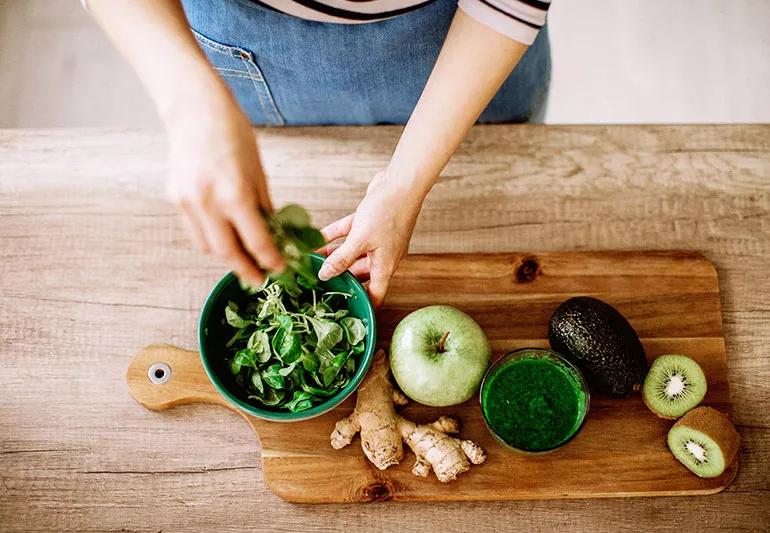Diet and exercise choices to manage acute myeloid leukemia symptoms

Image content: This image is available to view online.
View image online (https://assets.clevelandclinic.org/transform/209f2280-c43e-49cc-ae9e-6356562b6385/ManagingAML-1185313474-770x533-1_jpg)
A person fills a bowl with arugula next to a cutting board with ginger, an apple, cilantro, avocado and a kiwi.
If you’re receiving treatment for acute myeloid leukemia (AML), it probably feels like a lot of things are outside your control. But there are many small choices you can make each day — doable steps that can help you feel better inside and out.
Advertisement
Cleveland Clinic is a non-profit academic medical center. Advertising on our site helps support our mission. We do not endorse non-Cleveland Clinic products or services. Policy
“It’s important to have achievable nutrition and exercise goals to support your physical and mental health,” says cancer specialist Hetty Carraway, MD, MBA. In other words: Eating well and getting physical exercise will help you stay strong both in body and mind.
When you’re undergoing cancer treatment, you need to keep up your strength. Good nutrition helps your body heal and boosts your immune system to ward off infections. People who are well nourished may also tolerate chemotherapy side effects better.
Unfortunately, AML (and AML treatment) can make it hard to get all the calories your body needs to stay strong. You may have nausea or just lack any appetite (especially since chemotherapy can damage your taste buds and foods may lack flavor). Your favorite foods might suddenly taste strange and, as a result, you may not be as interested in eating them as you once were. “Foods taste different, which can make you less interested in eating,” says Dr. Carraway.
So how should you approach meals in this strange new world? Ideally, aim for three balanced meals a day. But that may not always be possible. “Make sure you’re taking in enough calories, and focus on foods that work for you. Everyone can be different in this regard,” Dr. Carraway emphasizes.
Advertisement
For some people, that might look like one big meal a day plus a nutrition shake. Others might do better with several smaller meals spread throughout the day. Some people might crave lots of fruit, while others have no appetite for it.
The goal: a balanced diet with good sources of protein, fruits, vegetables and carbohydrates. But it’s OK to let your appetite guide you in your quest for calories. “Whatever works for you, keep doing it,” she says.
These tips can help you consume enough healthy calories, even when you don’t feel like eating.
One word of caution: While your main goal is to get enough calories, there’s one calorie source you should steer clear of. “Alcohol is directly toxic to the bone marrow, so definitely avoid drinking alcohol when undergoing chemotherapy,” Dr. Carraway says.
During AML treatment, your body is more vulnerable to infections. To reduce the risk of foodborne infections, take these steps:
Do:
Don’t eat:
AML and its treatment often bring weakness and fatigue. So exercise might be the last thing on your mind. But moving your body each day can help you feel better physically and emotionally, Dr. Carraway says.
Regular physical activity can:
Advertisement
Not all exercises are appropriate for people with AML. Because of the risk of bleeding and infection, doctors will recommend you avoid certain activities such as golf, swimming and contact sports.
It’s always a good idea to talk to your care team before starting a new activity, to make sure it’s safe and appropriate. But most people with AML benefit from regular walking, Dr. Carraway says. “It’s safe, gentle and helps you maintain your strength and endurance.”
She encourages her patients to try to walk 1 to 3 miles each day. “You may not be able to do that all at once, but you can plan for several smaller bouts of activity each day,” she says. “Some days, if you’re not feeling well, that’s not possible. But if movement is part of your routine, it’s easier to stick with it when you’re feeling up to it.”
“Routine activities like walking will help you keep up your muscle strength and maintain your independence,” she adds.
Living with AML isn’t easy. But by setting small, attainable goals in your everyday life, you can help your mind and body stay strong.
Advertisement

Sign up for our Health Essentials emails for expert guidance on nutrition, fitness, sleep, skin care and more.
Learn more about our editorial process.
Advertisement
AML chemotherapy side effects can be challenging. Here’s how to keep them in check
Both leukemia and lymphoma are blood cancers — but one is found in your bone marrow, while the other is found in your lymph nodes
This cancer of the blood is rarely passed down, but genetics can help determine risk
7 tips to guide you through their treatment
There are often options, even at age 99
Recovery takes about 12 weeks, but you’ll likely feel a lot better by six weeks after surgery
Follow a balanced diet, get lots of rest, stay hydrated, tend to your mental health — and don’t skip your appointments
A variety of factors, including changes to your body as you age, may lead to new allergies later in life
Prioritize your health by managing stress, strengthening your social connections and getting quality sleep
Bolsters, blankets, pillows and blocks can offer extra support, stability and comfort
Allergies, postnasal drip, asthma or reflux could be to blame for a cough that won’t quit